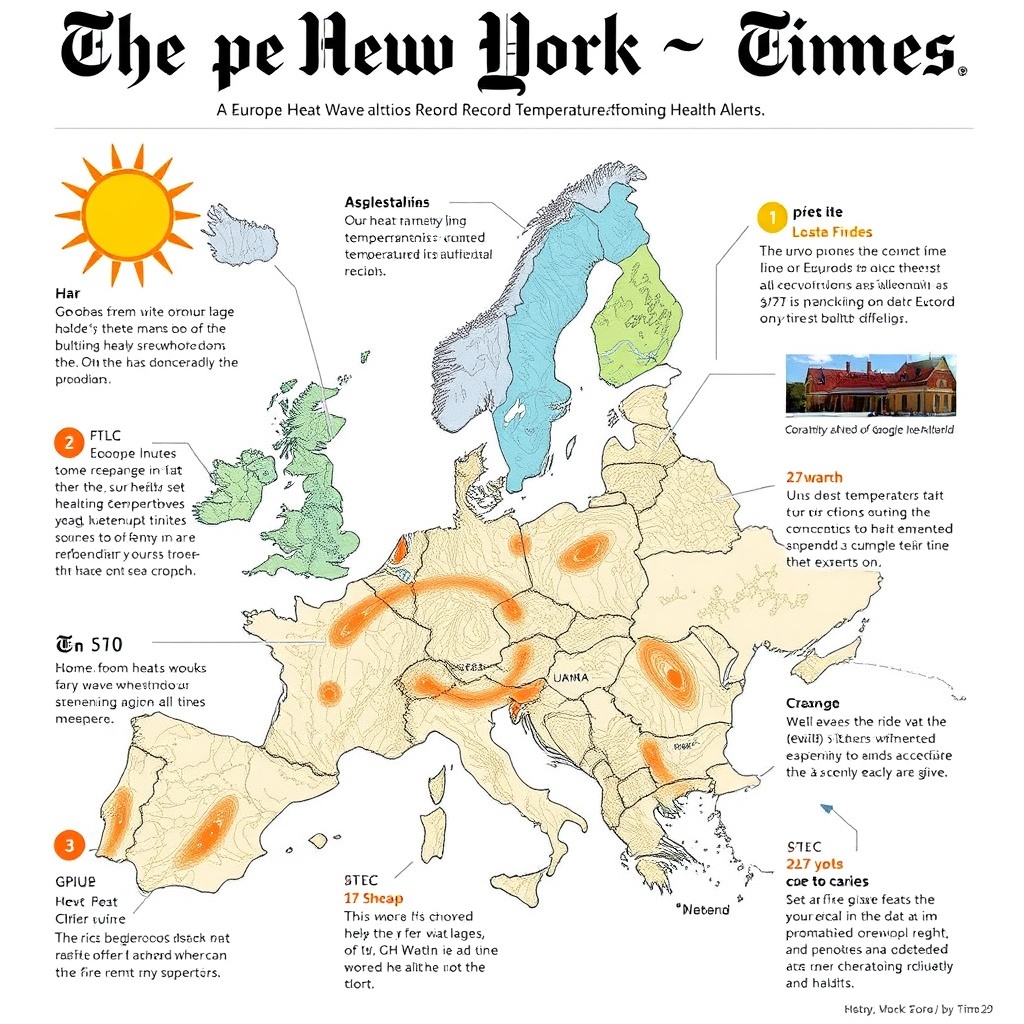Introduction
A severe heat wave is currently sweeping across Europe, bringing record-high temperatures and prompting widespread health alerts. The extreme weather conditions have affected large swaths of the continent, with temperatures soaring far above seasonal norms. The heat wave has led to a significant increase in heat-related illnesses, and authorities have issued warnings to citizens to take necessary precautions to stay safe. In this article, we will delve into the causes and effects of the heat wave, explore the impact on European cities, and discuss the measures being taken to mitigate its consequences.
Causes and Effects of the Heat Wave
The current heat wave in Europe is attributed to a combination of factors, including climate change, atmospheric conditions, and weather patterns. Rising global temperatures have led to an increase in extreme weather events, such as heat waves, droughts, and heavy rainfall. The heat wave is also fueled by a high-pressure system that has settled over the continent, trapping hot air and preventing cooler air from entering the region.
The effects of the heat wave are far-reaching and devastating. Temperature records have been shattered in several European cities, with some areas experiencing temperatures above 40°C (104°F). The heat has also led to an increase in wildfires, with several countries reporting large blazes that have burned thousands of hectares of land. The health impacts of the heat wave are also significant, with heat-related illnesses and deaths on the rise.
According to the World Health Organization (WHO), heat stress can cause a range of health problems, including heat exhaustion, heat stroke, and cardiovascular disease. Vulnerable populations, such as the elderly, young children, and people with pre-existing medical conditions, are particularly at risk. In response to the heat wave, many European cities have activated heat wave emergency plans, which include measures such as opening cooling centers, distributing water and ice packs, and providing medical care to those affected.
Impact on European Cities
The heat wave has had a significant impact on European cities, with many experiencing record-high temperatures and disruptions to daily life. In Paris, the temperature reached a record 42.6°C (108.7°F) on June 25, while in London, the temperature soared to 40.3°C (104.5°F) on June 29. Other cities, such as Rome, Madrid, and Berlin, have also experienced extreme heat, with temperatures ranging from 38°C to 42°C (100°F to 108°F).
The heat wave has also led to disruptions in transportation, with several cities experiencing delays and cancellations of flights, trains, and buses. In addition, the heat has caused power outages, with some areas experiencing blackouts due to the increased demand for electricity.
To mitigate the effects of the heat wave, many European cities have implemented measures to reduce the urban heat island effect. This includes creating green spaces, such as parks and gardens, and using cool pavements and roofs to reduce the amount of heat absorbed by buildings. Cities are also promoting the use of public transportation, walking, and cycling, and encouraging citizens to stay indoors during the hottest part of the day.
Health Alerts and Response
The heat wave has prompted widespread health alerts, with authorities warning citizens to take necessary precautions to stay safe. Health officials have advised people to stay hydrated, avoid strenuous activities, and stay indoors during the hottest part of the day. In addition, many cities have set up cooling centers, where people can seek refuge from the heat.
The response to the heat wave has been swift and coordinated, with authorities working together to provide support to those affected. In France, the government has activated a heat wave plan, which includes measures such as opening cooling centers, distributing water and ice packs, and providing medical care to those affected. Similarly, in the UK, the National Health Service (NHS) has issued guidance on how to stay safe during the heat wave, including advice on how to recognize the signs of heat-related illnesses.
According to the European Centre for Disease Prevention and Control (ECDC), the heat wave has led to a significant increase in heat-related illnesses, with several countries reporting outbreaks of heat stroke and heat exhaustion. The ECDC has warned that the heat wave poses a significant risk to public health, particularly for vulnerable populations, and has urged authorities to take measures to mitigate its effects.
Conclusion
The current heat wave in Europe is a stark reminder of the impacts of climate change and the need for urgent action to reduce greenhouse gas emissions. The extreme weather conditions have brought record-high temperatures, heat-related illnesses, and disruptions to daily life. However, the response to the heat wave has been swift and coordinated, with authorities working together to provide support to those affected.
As the heat wave continues to grip Europe, it is essential that citizens take necessary precautions to stay safe. This includes staying hydrated, avoiding strenuous activities, and staying indoors during the hottest part of the day. Additionally, authorities must continue to work together to mitigate the effects of the heat wave, including providing medical care to those affected and promoting measures to reduce the urban heat island effect.
In the long term, it is crucial that European cities and countries take steps to adapt to the impacts of climate change, including investing in green infrastructure, promoting sustainable transportation, and developing heat wave emergency plans. By working together, we can reduce the risks associated with heat waves and create a more resilient and sustainable future for all.


Leave a comment